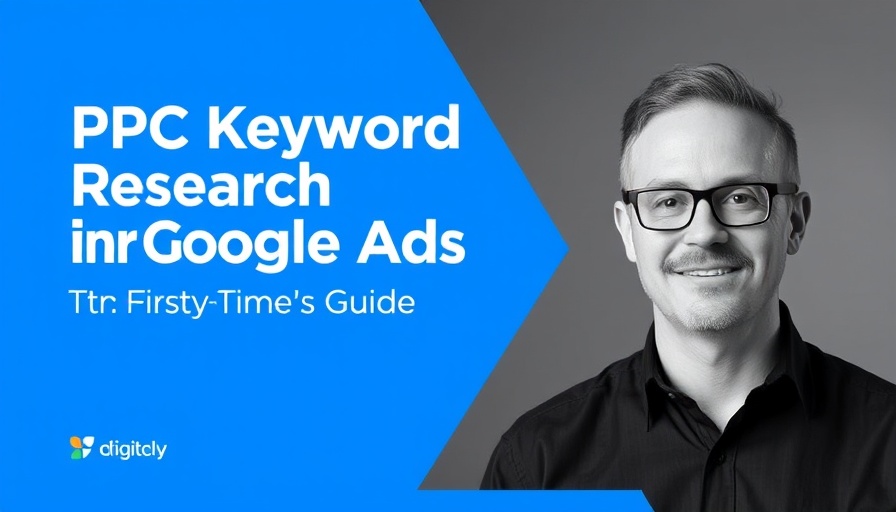
Unlocking the Power of PPC Keyword Research for Success
PPC keyword research is not just a step in launching an ad campaign; it's an essential strategy that can dictate your advertising success. Understanding what people type into Google when searching for products or services similar to yours allows you to not only target the right audience but also to enhance your return on investment (ROI). Whether you’re a novice or an experienced marketer, grasping these crucial principles can make a formidable difference.
Navigating Tools: Comparisons Beyond Google Keyword Planner
Many beginners rush to Google Keyword Planner, hoping for that instant answer to their keyword dilemmas. While it’s popular, it has some limitations. The tool often displays broad ranges of search volume, making it hard to ascertain how popular a keyword genuinely is. For example, the term “crypto wallet” could occupy a search volume range from 10k to 100k, which is a bit too ambiguous.
Moreover, Keyword Planner tends to lump similar keywords together, leading to generic suggestions that can stray away from the specific needs of your campaign. This can hinder your ability to discover long-tail or niche keywords essential for effective targeting. Thus, relying on more sophisticated tools like Ahrefs becomes invaluable. With Ahrefs, marketers can not only acquire clearer insights into keyword popularity but also gain visibility into competitor strategies, enabling a more competitive edge.
Why Low-Competition Keywords Might Just Be Your Best Friend
When asking seasoned PPC marketers for advice, one common recommendation is to focus on low-competition, specific keywords. This strategy markedly reduces the cost of clicks and helps attract users who are further along in the buying journey. Not convinced? Think about it this way: would you rather compete in a highly saturated market for a keyword or snag a tailored keyword at a fraction of the CPC (cost-per-click) with potentially higher conversion rates?
Discovering these keywords isn’t as elusive as it seems. By combining tools like Ahrefs’ Keywords Explorer with ChatGPT, you can expand your keyword list more effectively. Simply start with broad seed keywords and let the technology filter suitable options, all without the headache of manual searching.
Implementing Smart Strategies: Step-by-Step Guide
Engaging in PPC keyword research doesn’t stop at gathering keywords; it’s about implementing them correctly. Start with basic brainstorming of terms that relate to your business, followed by employing Ahrefs’ sophisticated tools to refine your findings. Explore the Matching Terms report while ensuring you concentrate on the geographical area of your target audience.
Another nifty trick is filtering keywords based on intent: commercial and transactional keywords often indicate the likelihood of conversion. Additionally, utilize the CPC filter to weed out overpriced keywords. Finally, every marketer should understand their maximum CPC calculations, which can be derived from:
Max CPC = (Product price x Profit margin x Conversion rate) for a precise budget strategy.
The Future of PPC Keywords: Harnessing AI and Creativity
As AI technology advances, its application in marketing strategies deepens, particularly in the area of keyword research. Tools like ChatGPT can significantly streamline the entire process from keyword discovery to optimization. The future of keyword research and PPC advertising lies at the intersection of human creativity and machine efficiency. By leveraging these innovations, digital marketers can create more personalized and impactful advertising strategies that resonate with their target audiences.
Common Misconceptions and Pitfalls to Avoid
It's easy to fall into traps when diving into PPC keyword research. One common misconception is that high search volume equals higher conversions. This isn't always the case. In fact, sometimes lower volume keywords can yield better results simply due to user intent being sharper. Hence, focusing on relevancy over sheer volume is paramount.
Additionally, many beginners believe they can solely rely on one tool. The blended approach—utilizing different analytical tools not only provides a broader perspective but also more comprehensive data that can aid in making informed bidding decisions.
Critical Takeaways: Valuable Insights for Marketers
The landscape of PPC is continuously evolving. With the shift towards AI-enhanced tools, it’s crucial for marketers to adapt to these changes and incorporate these advances into their strategies. Understanding the balance between high-competition and low-competition keywords, the importance of intent in keyword selection, and leveraging advanced tools will help refine your PPC campaigns. This balanced approach greatly enhances the efficiency and effectiveness of your marketing efforts.
Wrapping Up: The Power of Knowledge
PPC keyword research may seem daunting, especially for newcomers. However, by following a structured approach and utilizing the right tools, marketers can find keyword opportunities that drive significant results. Whether you’re gearing up for a new campaign or looking to refresh an existing one, the right keyword strategy can make the difference between a standard ad and a high-converting powerhouse.
 Add Row
Add Row  Add
Add 




Write A Comment